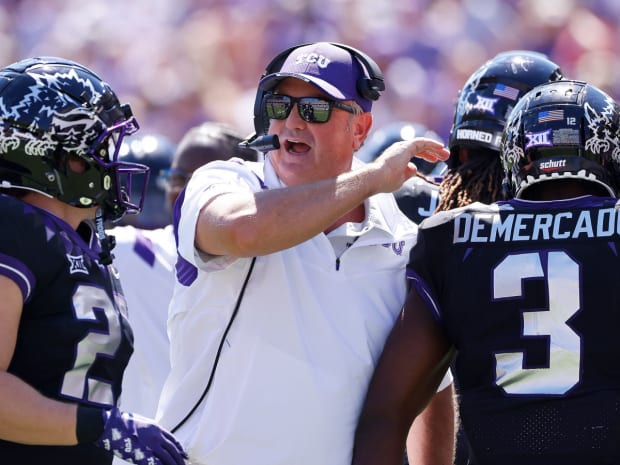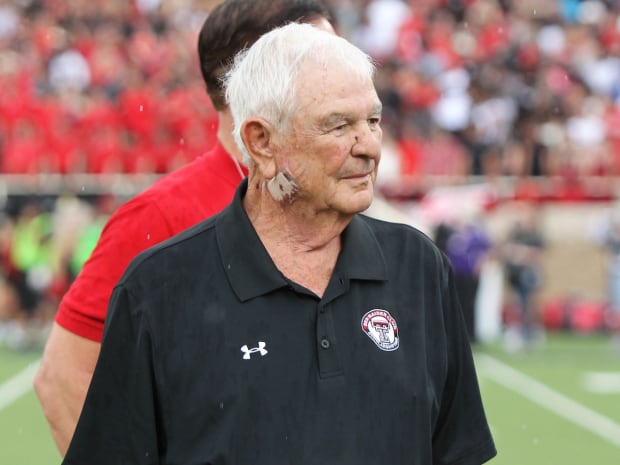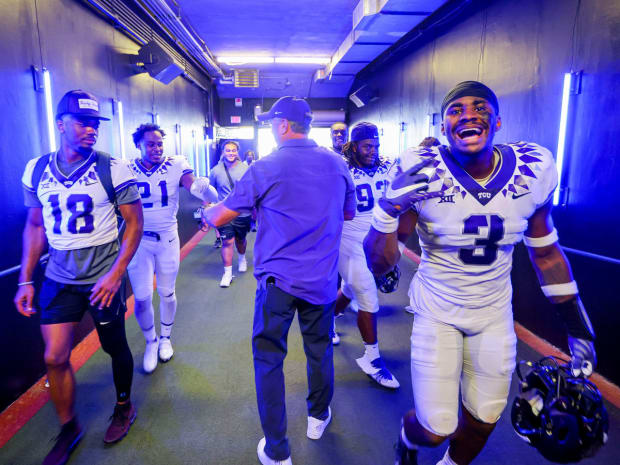Just like his father, Spike, he’s leading a Big 12 school and using his deep roots in the state to build success.
Sonny Dykes has a stack of bibles on a shelf behind his desk. Texas bibles, that is. Also known as Dave Campbell’s Texas Football yearbooks.
They are grassroots cultural touchstones, these thick annual magazines devoted to covering college and high school football in the state that loves college and high school football the most. DCTF has been published every year since 1960, and says it has a circulation of 100,000. When the yearbooks begin appearing in stores in June, previewing teams of all levels across the massive state, word spreads like a High Plains sandstorm.
“We always used to run to the grocery store and get it in high school,” Dykes says. “You always wanted to see, hey, did they mention me in the article?”
The magazine may or may not have mentioned young Sonny Dykes of Coronado High School in Lubbock back in the 1980s. It definitely mentions him these days.
From 2018 to ’21, he was the coach at SMU in Dallas. This year he’s gone 44 miles west on I-30 to Fort Worth and TCU. And if his Horned Frogs maintain their blistering undefeated start to this season, he could be the cover boy next year. Just like his daddy was 32 years ago.

Ron Jenkins/AP
Spike Dykes was the head coach at Texas Tech from 1986 to ’99. He remains the longest-tenured football coach in school history, with an 82-67-1 record, and a dozen of those wins were over in-state big dogs Texas and Texas A&M. And in ’90, Spike was the Dave Campbell yearbook cover boy—a cover that is framed on the wall of Sonny’s office.
That hints at the depth of Sonny’s roots in Texas’s foundational sport—from the framed cover to the stack of bibles to all the stories he has from growing up as a legendary coach’s son in the state. (There can be nothing more Texas than a football coach named Spike Dykes.) He has large quantities of Lone Star street cred.
Sonny’s left a few times, but always came back. Now, the 52-year-old may never leave again. While glam programs Texas and Texas A&M are struggling with coaches who grew up in California and West Virginia, No. 17 TCU is rolling into an improbable Big 12 showdown at Kansas on Saturday with an authentic Texas guy leading the way.
At the moment, if anyone deserves to be crowned the King of Texas Football in 2022, it’s Daniel “Sonny” Dykes.
It was Thanksgiving night in Austin, 1976. Immediately after a dispiriting loss to the Aggies, Longhorns assistant coach Spike Dykes grabbed his two young sons, Rick and Sonny, and brought them into the locker room to hear something. The boys listened raptly as the great Darrell Royal informed his team that he was retiring; the season finale against Arkansas the next week would be his last.
“I was six years old,” Sonny says. “I remember it like it was yesterday.”
He remembers the fall Sundays when the neighborhood moms would fill a couple of station wagons with kids and take them to Memorial Stadium to play football on the artificial turf. And he remembers his dad bringing home the ultimate Texas souvenirs of the time: shredded No. 20 jerseys. The tearaway uniforms that were all the rage had been worn by blooming legend Earl Campbell, who would go on to win the Heisman Trophy in 1977.
But Royal’s retirement uprooted the Dykes family—Spike took a job outside Texas for the first time in his life, as an assistant at New Mexico. Then there was a year at Mississippi State on the staff of Emory Bellard, another Texas expat who landed there after being at A&M.
After that, Spike heeded the call of home, returning to another intersection with Texas football lore. In 1980 he became the coach at Midland Lee High School, which was the arch rival of Odessa Permian, the school made famous later that decade in the book Friday Night Lights. That nonfiction work, which gave the world a window into the towering importance of high school football in the state, subsequently spun off a movie and television series.
Midland and Odessa are 20 miles apart but a long way from anywhere else, in a place where those Friday night lights illuminated massive high school stadiums for towns that size. Adolescent Sonny Dykes spent four years playing sports with and against the players who would be the main characters in the book, while his dad coached against Permian’s Gary Gaines. While Buzz Bissinger’s book was a runaway bestseller, its unflinching narrative cut too close to the bone for many who lived in the area.
“I thought the book was right on the money,” Sonny says. “It was not a popular opinion, but there wasn’t one thing in there that wasn’t true. I think he gave an outsider’s perspective of what it was, and all of us were too deep in it to know what it looked like to a normal person.”

Michael C. Johnson/USA TODAY Sports
Sonny never got to play in the Permian-Lee rivalry. Spike was hired as defensive coordinator at Texas Tech, and Sonny’s high school career was spent in Lubbock. In 1986, Spike was promoted to head coach at Tech—something that solidified his status and economic well-being in the state, but he never forgot where he came from. Just about every time Spike Dykes was asked to name the biggest win of his coaching career, this was his answer: guiding Coahoma High to an upset of Aspermont in the ’65 Texas 1A state playoffs.
“Sure, more people care about the Super Bowl, but they don’t care any more than we did about beating Aspermont,” Spike said 15 years ago. “Losing a big high school game doesn’t hurt any less to the players involved than losing the Super Bowl.”
This was part of the eternal charm of Spike. He was the walking, drawling stereotype of a Texas football coach, dispensing small-town wisdom and colorful colloquialisms when discussing the thrill of victory and the agony of defeat.
“They whipped us like a tied-up goat.”
“When you have five turnovers, miss two field goals and get another one blocked—my gosh, that’s enough to choke a mule.”
“A lot of people want to be around when you’re having the parade, but not many want to serve as pallbearer.”
“We played like about three tons of buzzard puke this afternoon.”
“They say you lose 10% of your fan base every year. And I’ve been here 11 years, so you do the math.”
“Last time Texas Tech was in the Cotton Bowl, Moby Dick was a minnow.”
Spike took Tech to the 1994 Cotton Bowl, the school’s first since ’38. It was the fourth of seven bowl appearances for the Red Raiders under Spike, who retired in ’99. By then, Sonny’s own coaching career had reached the major-college level—following the family business, but doing it very differently.
The first thing you notice about the new King of Texas Football is that he doesn’t sound like a Texas football coach. Sonny Dykes has no drawl, no twang, not much in the way of one-liners—really, nothing you’d expect from a son of Spike.
Sonny chalks that up to having spent more than a decade of his coaching career living elsewhere—Kentucky, Louisiana, Arizona and most quixotically, the San Francisco Bay area. After catching on with Air Raid offensive innovators Hal Mumme and Mike Leach at Kentucky, Sonny went back home with Leach to Texas Tech but then was offensive coordinator at Arizona before landing his first head-coaching gig, at Louisiana Tech. From there he was hired at California, which proved to be as odd a fit as you might imagine.
“I’ve always been kind of a curious guy,” Sonny says. “People ask me all the time, ‘How in the world did you end up at Cal?’ I thought I understood the place. I wasn’t a good fit, and it’s a hard place. A very, very difficult place. I brought a strength coach from the South, my offensive coordinator was [fellow Mumme Air Raid zealot] Tony Franklin—there was some oil and water. I probably made some bad decisions, and I wasn’t a great fit.
“It took us a long time to figure the place out. We got the train going in the right direction, but culturally it was going to be hard. I think it made me realize how much I wanted to be in Texas, wanted to be in the state and part of the culture of football in Texas.”
During his four years at Cal, Sonny sent out some feelers about open jobs in Texas. When he was fired in 2016 after a 5–7 season, he made a beeline back home. He spent the ’17 season as an offensive analyst at TCU under Gary Patterson, then got the head-coaching job at SMU.
Dykes won in Dallas, going 25–10 his final three years. But when Frogs program patriarch Patterson was controversially fired during the 2021 season, it was clear that both TCU and Dykes were angling for each other. While changing sides in a rivalry can be dicey, the advantages of Big 12 membership and surprisingly dazzling facilities tilted things in favor of leaving for the other side of the Metroplex.
“The stability here was one of the big factors, the stability of the investment,” Sonny says. “In some ways there is always that battle—do you invest in the program and hope for the results, or do you wait for results and then invest in the program? I don’t know when that happened here, but both things happened.
“All of a sudden you’ve got this great result that no one expected, and you’ve built this beautiful stadium and these great facilities. I think there’s a sense, from the chancellor on down, how important TCU football is to the university and the community of Fort Worth. Being in the Big 12, that was just the pinnacle of football for me. It’s always where I wanted to coach and where I wanted to be.”
What Patterson built, Dykes has modified and modernized. Everyone at TCU wishes the parting with Patterson—who won 181 games with the Horned Frogs—had gone better. But everyone also agrees that the program had gotten a little stale and needed freshening. Enter Dykes, a creative offensive coach who simply has a lighter touch. The program is more accessible on a daily basis to fans and media.

Gareth Patterson/AP
As for talent? There was a pretty good amount already on hand—after the predictable initial flurry of transfers, only one player left after spring practice. The transfer portal helped fill a few immediate needs. The preseason vibe around the program was quiet optimism, with a smirk at the Big 12 preseason media poll that predicted the Frogs would finish seventh. (Last time TCU was picked to finish seventh in the league, it went 12–1 and won the Peach Bowl.)
Dykes played it coy with his quarterbacks before the season, actually declaring that he might play three of them. He started Chandler Morris in the opener against Colorado, but Morris got hurt in the third quarter, and that unleashed a monster in backup Max Duggan.
Duggan leads the nation in pass efficiency (202.18) and has gotten better with every start. In the upset romp of Oklahoma last weekend, he threw for 302 yards and three touchdowns and ran for 116 yards and two more TDs. TCU leads the Big 12 and is second nationally in total offense and scoring offense. The Frogs are explosive and fun, and heading to a showdown with Kansas that nobody saw coming.
That game has abruptly shifted the Big 12’s Saturday spotlight from the usual Texas-Oklahoma rivalry game in Dallas to Lawrence, Kan. In a tweaking of the establishment that would surely tickle Spike Dykes, it has taken Sonny just a month to profoundly shake up the hierarchy. Why not the Horned Frogs?
This is what the new King of Texas was born (and raised) to do.
“It’s the biggest cliche in the world, but I was lucky to spend that time out of the state because now I know how much it means to me to be here,” he says. “Every time I go to a high school football game here, I appreciate it. When I drive to work, I’m excited to be in the state of Texas and coaching football where it means something.”
More College Football Coverage:
• College Football Coach Fights We Want to See
• Wisconsin Makes Season’s Most Ruthless Firing Yet
• Big 12 Leads College Football’s New World Order